Fleurs du Mal Magazine


.jpg)
.jpg)
.jpg)
.jpg)
.jpg)
.jpg)
.jpg)
.jpg)
.jpg)

Joep Eijkens photos
New York, New York! 3
© joep eijkens 2008
fleursdumal.nl magazine – magazine for art & literature
.jpg)
More in: FDM in New York, Joep Eijkens Photos
![]()
Zondag 30 augustus 2009
Boeken rond het Paleis Tilburg
JOKE VAN LEEUWEN
Literair programma met Joke van Leeuwen in het Paleis-Raadhuis Tilburg
Stichting Dr. P.J. Cools organiseert tijdens de 12e editie van Boeken rond het Paleis een literair programma van Joke van Leeuwen – auteur, illustrator, performer én stadsdichter van Antwerpen- samen met pianiste Caroline Deutman. Zij zullen poëzie ten gehore brengen, met alle soorten muziek. Het wordt een programma, voor jong en oud, waarbij Joke van Leeuwen graag het publiek betrekt. Joke van Leeuwen heeft dit poëzieprogramma de titel:‘A ‘ gegeven.
Zondag 30 augustus 2009 – Van 11.30 – 12.30 in het Paleis-Raadhuis Tilburg –De toegang is gratis.
![]()
Zei ze
Zei ze hadden we nieuwe ontferming
besteld wij, ze zouden die brengen,
de nieuwe ontferming, op vrijdag.
Zeggen ze vrijdag kan het op zaterdag.
Zeggen we ja, maar dan wel in
de morgen. Zeggen ze gaat niet,
dat gaat niet, de morgen. Zegt mijn
man goed, dan kom ik die zelf halen,
zaterdag dan in de morgen, dat kan?
Ja dat kan, zeggen ze. Komt hij daar,
zaterdag, nergens ontferming. Zegt hij
hoezo niet, die zou er toch wezen?
Nee nee, die is er niet, komt u maar
vrijdag. Zegt hij wat vrijdag, ik moet
die meteen. Zeggen ze gaat niet, die
is nog niet binnen. Zegt hij u zei toch
dat die er nu was? Zeiden ze
moeten we zeggen van niet dan,
wilt u dat horen,
van zeggen van niet?
Joke van Leeuwen
Uit: Wuif de mussen uit (Querido)
![]()
Joke van Leeuwen (Den Haag, 1952) studeerde in Antwerpen en Brussel grafische technieken aan de kunstacademie en geschiedenis aan de universiteit van Brussel. Ze is veelzijdig: ze schrijft proza voor kinderen en volwassenen, poëzie, ze is illustrator, maakt theaterprogramma’s en treedt op als performer.
Ze ontving voor haar werk vele prijzen, waaronder de Theo Thijssenprijs in 2000 voor haar kinderboeken; de C. Buddingh’-prijs voor haar dichtbundel Laatste lezers (1994). Er volgden meer bundels, zoals Vier manieren om op iemand te wachten, waarvan het titelgedicht werd uitgeroepen tot een van de drie beste gedichten van 2001. De bundel Wuif de mussen uit (2007) werd genomineerd voor de VSB Poëzieprijs. In 2002 publiceerde zij de roman Vrije vormen.
Meer informatie over Boeken rond het Paleis website Stichting Cools: www.stichtingcools.nl
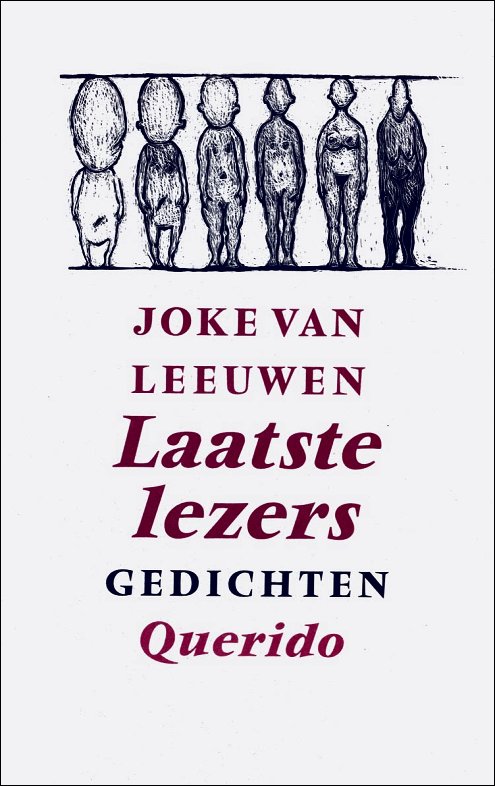
fleursdumal.nl magazine
More in: Archive K-L, Art & Literature News
.jpg)
A r t h u r R i m b a u d
(1854-1891)
Les reparties de Nina
LUI – Ta poitrine sur ma poitrine,
Hein ? nous irions,
Ayant de l’air plein la narine,
Aux frais rayons
Du bon matin bleu, qui vous baigne
Du vin de jour ?…
Quand tout le bois frissonnant saigne
Muet d’amour
De chaque branche, gouttes vertes,
Des bourgeons clairs,
On sent dans les choses ouvertes
Frémir des chairs :
Tu plongerais dans la luzerne
Ton blanc peignoir,
Rosant à l’air ce bleu qui cerne
Ton grand oeil noir,
Amoureuse de la campagne,
Semant partout,
Comme une mousse de champagne,
Ton rire fou :
Riant à moi, brutal d’ivresse,
Qui te prendrais
Comme cela, – la belle tresse,
Oh ! – qui boirais
Ton goût de framboise et de fraise,
O chair de fleur !
Riant au vent vif qui te baise
Comme un voleur,
Au rose, églantier qui t’embête
Aimablement :
Riant surtout, ô folle tête,
À ton amant !….
………………………………………………..
– Ta poitrine sur ma poitrine,
Mêlant nos voix,
Lents, nous gagnerions la ravine,
Puis les grands bois !…
Puis, comme une petite morte,
Le coeur pâmé,
Tu me dirais que je te porte,
L’oeil mi-fermé…
Je te porterais, palpitante,
Dans le sentier :
L’oiseau filerait son andante
Au Noisetier…
Je te parlerais dans ta bouche..
J’irais, pressant
Ton corps, comme une enfant qu’on couche,
Ivre du sang
Qui coule, bleu, sous ta peau blanche
Aux tons rosés.
Et te parlant la langue franche – …..
Tiens !… – que tu sais…
Nos grands bois sentiraient la sève,
Et le soleil
Sablerait d’or fin leur grand rêve
Vert et vermeil
………………………………………………..
Le soir ?… Nous reprendrons la route
Blanche qui court
Flânant, comme un troupeau qui broute,
Tout à l’entour
Les bons vergers à l’herbe bleue,
Aux pommiers tors !
Comme on les sent toute une lieue
Leurs parfums forts !
Nous regagnerons le village
Au ciel mi-noir ;
Et ça sentira le laitage
Dans l’air du soir ;
Ca sentira l’étable, pleine
De fumiers chauds,
Pleine d’un lent rythme d’haleine,
Et de grands dos
Blanchissant sous quelque lumière ;
Et, tout là-bas,
Une vache fientera, fière,
À chaque pas…
– Les lunettes de la grand-mère
Et son nez long
Dans son missel ; le pot de bière
Cerclé de plomb,
Moussant entre les larges pipes
Qui, crânement,
Fument : les effroyables lippes
Qui, tout fumant,
Happent le jambon aux fourchettes
Tant, tant et plus :
Le feu qui claire les couchettes
Et les bahuts.
Les fesses luisantes et grasses
D’un gros enfant
Qui fourre, à genoux, dans les tasses,
Son museau blanc
Frôlé par un mufle qui gronde
D’un ton gentil,
Et pourlèche la face ronde
Du cher petit…..
Que de choses verrons-nous, chère,
Dans ces taudis,
Quand la flamme illumine, claire,
Les carreaux gris !…
– Puis, petite et toute nichée,
Dans les lilas
Noirs et frais : la vitre cachée,
Qui rit là-bas….
Tu viendras, tu viendras, je t’aime !
Ce sera beau.
Tu viendras, n’est-ce pas, et même…
Elle – Et mon bureau ?
Arthur Rimbaud, Les reparties de Nina
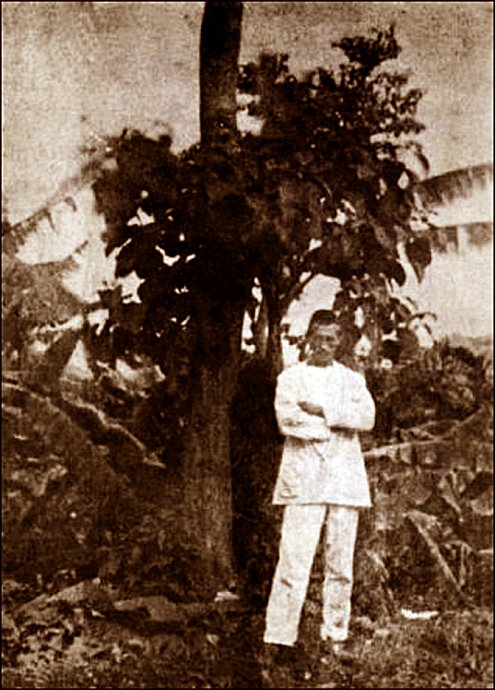
fleursdumal.nl magazine
More in: Archive Q-R, Arthur Rimbaud, Rimbaud, Arthur, Rimbaud, Arthur
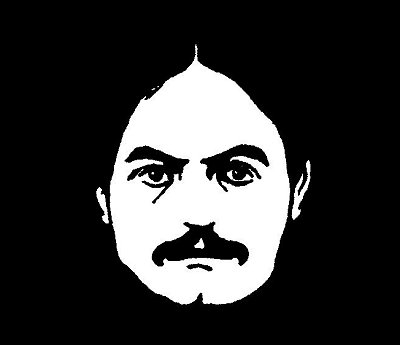
Alfred Jarry
(1873-1907)
Fable
Une boîte de corned-beef, enchaînée comme une lorgnette,
Vit passer un homard qui lui ressemblait fraternellement.
Il se cuirassait d’une carapace dure
Sur laquelle était écrit à l’intérieur, comme elle, il était sans arêtes,
(Boneless and economical);
Et sous sa queue repliée
Il cachait vraisemblablement une clef destinée à l’ouvrir.
Frappé d’amour, le corned-beef sédentaire
Déclara à la petite boîte automobile de conserves vivante
Que si elle consentait à s’acclimater,
Près de lui, aux devantures terrestres,
Elle serait décorée de plusieurs médailles d’or.
Je ne sais pas
Je ne sais pas si mon frère m’oublie
Mais je me sens tout seul, immensément,
Avec loin la chère tête apalie
Dans les essais d’un souvenir qui ment.
J’ai son portrait devant moi sur la table,
Je ne sais pas s’il était laid ou beau.
Le Double est vide et vain comme un tombeau.
J’ai perdu sa voix, sa voix adorable,
Juste et qui semble faite fausse exprès.
Peut-être il l’ignore, trésor posthume.
Hors de la lettre elle s’évoque, très
Soudain cassée et caressante plume.
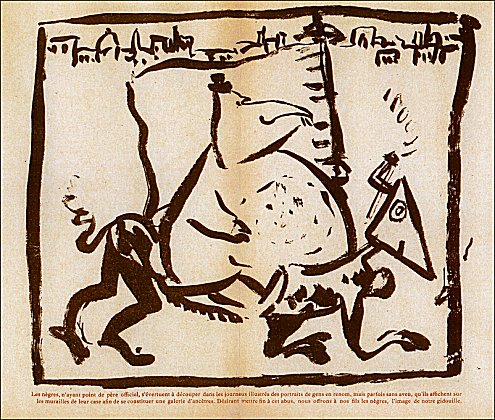
Mon père a fait faire un étang
Mon père a fait faire un étang,
C’est le vent qui va frivolant,
Il est petit, il n’est pas grand,
C’est le vent qui vole, qui frivole,
C’est le vent qui va frivolant.
Il est petit, il n’est pas grand,
Trois canards blancs s’y vont baignant.
Trois canards blancs s’y vont baignant,
Le fils du roi les va chassant.
Le fils du roi les va chassant
Avec un p’tit fusil d’argent.
Avec un p’tit fusil d’argent
Tira sur celui de devant.
Tira sur celui de devant,
Visa le noir, tua le blanc.
Visa le noir, tua le blanc,
Ô fils du roi, qu’tu es méchant.
Ô fils du roi qu’tu es méchant,
D’avoir tué mon canard blanc,
D’avoir tué mon canard blanc,
Après la plume vint le sang,
Après la plume vint le sang,
Après le sang l’or et l’argent.
Après le sang l’or et l’argent,
C’est le vent qui va frivolant,
Après le sang, l’or et l’argent,
C’est le vent qui vole, qui frivole,
C’est le vent qui va frivolant.
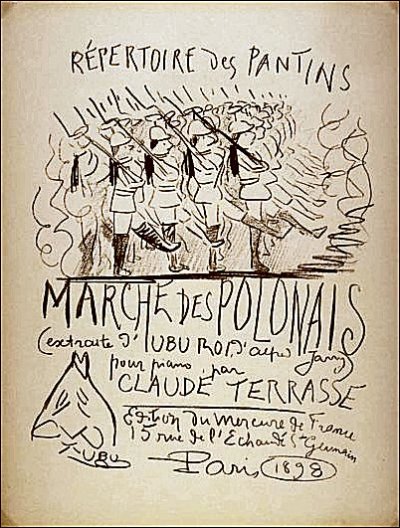
Roses
Roses de feu, blanches d’effroi,
Les trois Filles sur le mur froid
Regardent luire les grimoires…
Roses de feu, blanches d’effroi,
En longues chemises de cygnes,
Les trois Filles sur le mur froid,
Regardant grimacer les signes,
Ouvrent, les bras d’effroi liés,
Leurs yeux comme des boucliers.
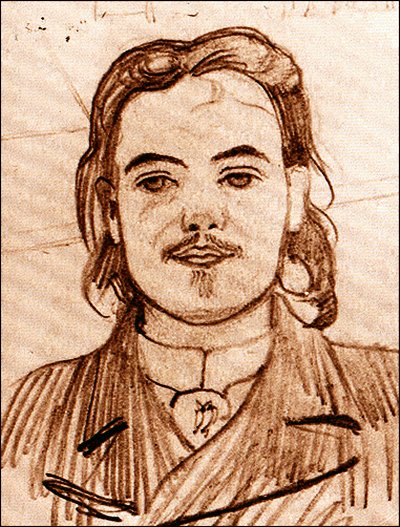
fleursdumal.nl magazine
More in: Archive I-J, Archive I-J, Félix Vallotton, Jarry, Alfred, OULIPO (PATAFYSICA), Surrealism

Thomas von Kempen
(Thomas van Kempen, Thomas a Kempis)
(1380-1471)
Gebet…
Um die Gnade der Andacht zu erflehen
Herr, mein Gott, all mein Gut bist Du.
Und wer bin ich, daß ich wage, zu Dir zu reden?
Ich bin Dein ärmstes Knechtlein
und ein verachtetes Würmlein,
viel ärmer und verächtlicher
als ich es weiß und zu sagen wage.
Gedenke doch, Herr,
daß ich nichts bin,
nichts habe und nichts vermag.
Du allein bist gut, gerecht und heilig.
Du kannst alles, leistest alles, erfüllst alles;
nur den Sünder lässest Du leer ausgehen.
Sei Deiner Erbarmungen eingedenk
und erfülle mein Herz mit Deiner Gnade,
der Du nicht willst,
daß Deine Werke fruchtlos seien.
Wie kann ich mich ertragen
in diesem elenden Leben,
wenn Du mich nicht stärkst
mit Deinem Erbarmen
und Deiner Gnade?
Wolle nicht abwenden
Dein Antlitz von mir;
wolle nicht Deine Heimsuchung verlängern;
wolle nicht Deinen Trost abziehen,
daß nicht werden
“meine Seele wie eine Erde
ohne Wasser vor Dir”.
Herr,
lehre mich Deinen Willen tun,
lehre mich vor Dir würdig und demütig wandeln:
denn meine Weisheit bist Du,
der Du mich in Wahrheit kennst
und gekannt hast,
ehe die Welt geschaffen war
und ehe ich geboren war in der Welt.

Thomas a Kempis: Gebet
KEMP=MAG – kempis poetry magazine
More in: MONTAIGNE, Thomas a Kempis
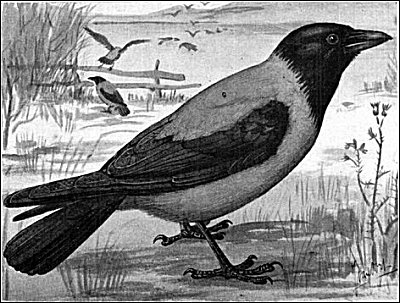
Guido Gezelle
(1830-1899)
Bonte kraaie
Bonte kraaie, waar, och armen,
kunt gij, voor uw’ taaie darmen,
voedsel vinden, worme of slek,
in dit daaglijkschbroodgebrek?
Eerde en water zijn gesloten,
overal ligt snee’ gegoten;
en, ‘k en zie geen mensch die ooit
kaf voor u of kooren strooit.
Gij en weet van schuur noch schelven,
van geen’ wortelen weg te delven;
en ge’n hebt geen’ spiere brood
bijgeleid, tot meerder nood!
Gij en grijpt, gelijk de gieren,
niet uw’ eigen mededieren;
ook en heet uw kerstenbrief
"eier-" u, noch "kiekendief."
Welke een’ armoe komt deswegen,
gij nu, binst den winter, tegen;
als, alom met snee’ bezaaid,
veld en wee van honger kraait.
In die snee’ zie’k, aller straten,
uw tweevoetig speur gelaten:
eet gij snee’, of, half vergaan,
laaft gij uwen dorst daaraan?
Of, hoe kunt gij, vast aan ‘t vliegen,
immers uwen buik bedriegen?
Kraait, of is hij, lijk uw’ stem,
zwijgende? Hoe snoert gij hem?
Neen, ‘k en hoor geen klachte u klagen,
schoon veel andere om hulpe vragen,
piepen, kriepen, om end om:
bonte kraaie, wordt gij stom?
Ei, onmooglijk is u ‘t leven,
stonde er niet dit woord geschreven,
dat daar Een is die u voedt,
en u nooddruft vinden doet.
Een, die de akkerlelie kleêren
weeft, als Salomons, vol eeren;
Een die, zonder naalde of naad,
vacht en veder groeien laat.
En, voorwaar, ‘k en zie geen lijken,
bonte kraaie, ooit in de dijken
liggen, van uw volk; of dood
uwe oorije, van hongersnood.
‘k Hoor de menschen bitter klagen,
van de kwade winterdagen;
‘k wete er, van gebrek en pijn,
louter, die gestorven zijn.
Gij betrouwt op God, onwetend
aan Zijn’ wetten vastgeketend;
die u vulte en voedsel schiep,
eer Hij u in ‘t leven riep.
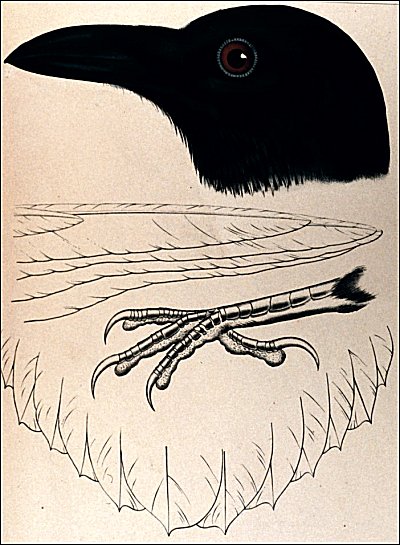
Hij heeft u twee vlerken neven
‘t lijf gezet, en kracht gegeven;
en twee oogen voert gij fijn
die scherp ziende en verre zijn.
Op die vlerken zie ‘k u roeien
door de lucht, en voorwaards spoeien:
in een omzien, stikken breed,
verre weg van mij gescheed.
Uit die oogen zie ‘k u spieden,
hooge boven land en lieden;
hooge boven huis en al:
of u God iet geven zal.
Bonte kraaie, uw schamel wezen
leert een’ schoone lesse aan dezen
die verkwisten ‘t daaglijksch brood,
etend, zonder etensnood.
Ach, verdeelden ze, alle dagen,
‘t brood, dat ze onzen Vader vragen,
met zoo menig armen bloed,
die ‘t, lijk gij, gaan zoeken moet?
Waar de neerstig nauwe boeren
hun gegraande peerden voeren,
trekkende aan den wagenlast,
daar is ‘t dat uw kooren wast.
Hun verlies komt u te baten,
en zoo zie ‘k u, achter straten,
raad- en roekloos van gebrek,
pekken in nen peerdendrek!
‘k Zie u neerstig ‘t leven halen,
‘k zie u nederig zegepralen
op een hoopken mesch, verblijd,
lijk sint Job, in zijnen tijd.
Bonte kraaie, ‘t doet mij dere
dat ik uwen troost begere,
en, eilaas, het doen daarvan
dat ik daar niet aan en kan!
Laat den winter eens verdwijnen,
laat de Aprilsche zonne schijnen:
dan, o kraaie, krijgt ge uw deel
in Gods goedheid, algeheel.
Dan zal God u voedselvollen
nooddruft doen op de eerdeschollen
vinden, en den ploeg omtrent,
die den veien akker wendt.
Dan, uw herte omhoog gerezen,
laat den buik eens weeldig wezen;
dan, te lijze of luider stem,
looft met alle vogels Hem!

Guido Gezelle: Bonte kraaie
kempis poetry magazine
More in: Department of Ravens & Crows, Gezelle, Guido
.jpg)
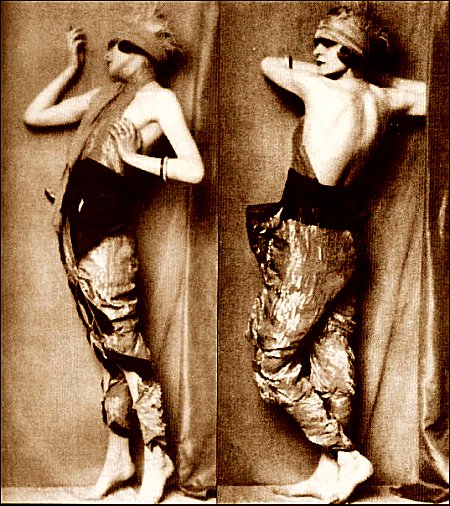
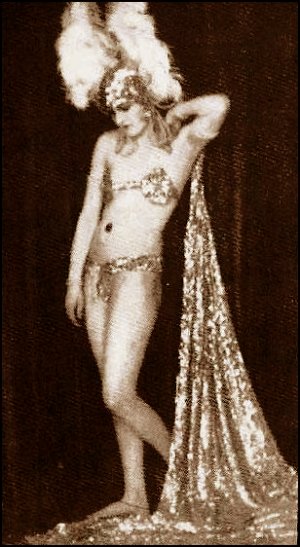
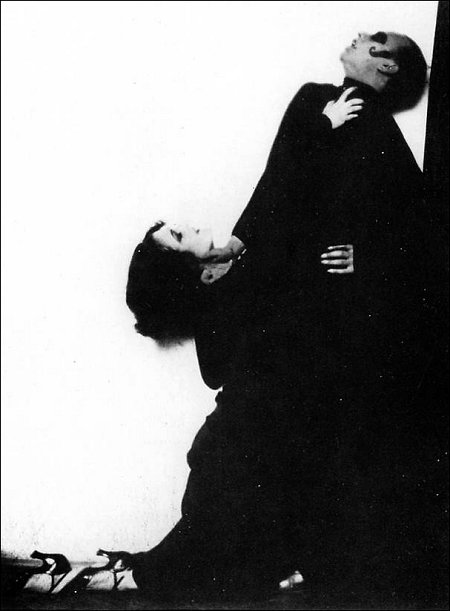

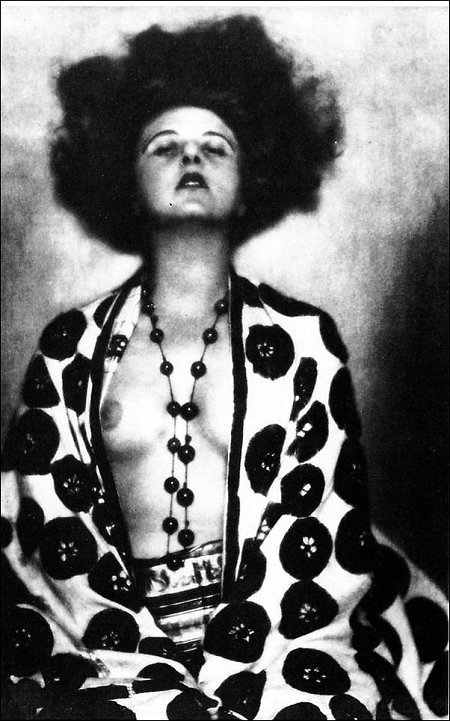
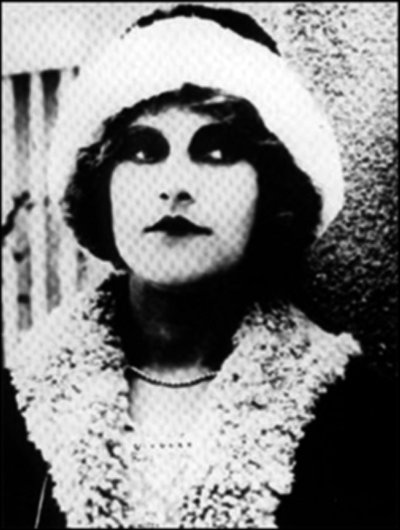
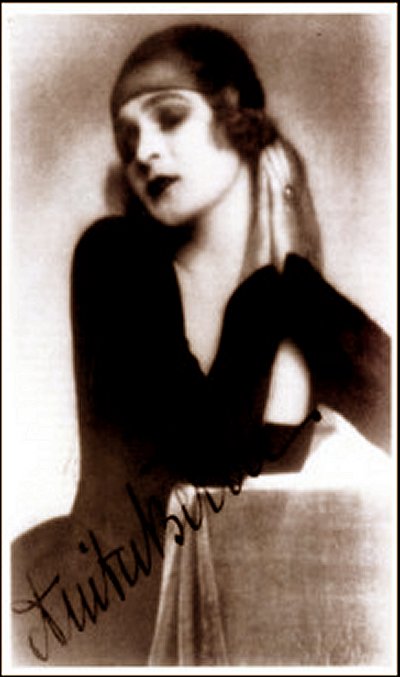


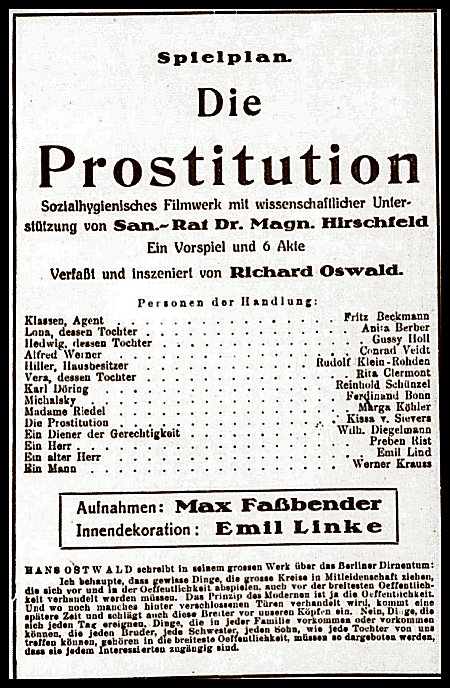


Galerie Anita Berber – 3
Anita Berber (June 10, 1899 – November 10, 1928) was a German dancer, actress and writer. Anita Berber was painted by many artist, among them Otto Dix. Her lover was dancer Sebastian Droste. In 1922, Berber and Droste published a book of poems, photographs, drawings: Kokain.
Berber’s cocaine addiction and bisexuality were matters of public chatter. She was allegedly the sexual slave of a woman and the woman’s 15-year-old daughter. She could often be seen in Berlin’s hotel lobbies, nightclubs and casinos, naked apart from a sable wrap and a silver brooch filled with cocaine. Besides being a cocaine addict, she was an alcoholic.Anita Berber died of tubercolosis, at the age of 29, on November 10, 1928 in a Kreuzberg hospital and was buried at St. Thomas cemetery in Neukölln. In 1987 Rosa von Praunheim made a film titled: Anita – Tänze des Lasters.
fleursdumal.nl magazine
More in: Anita Berber, Anita Berber, Berber, Anita, DANCE & PERFORMANCE

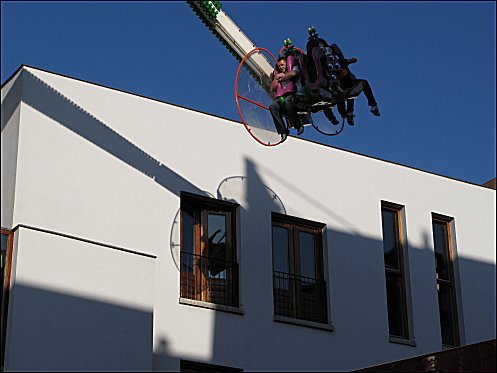



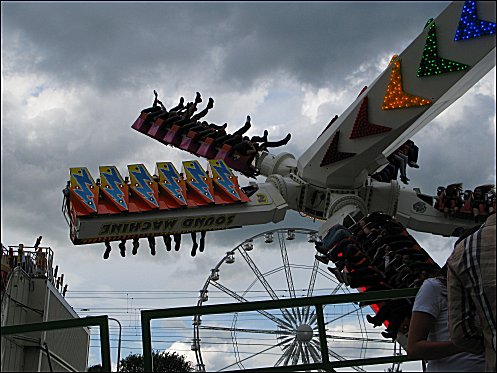


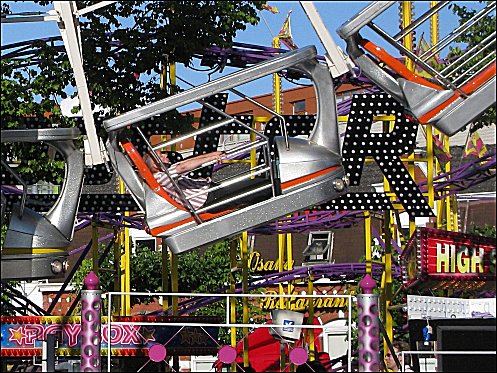
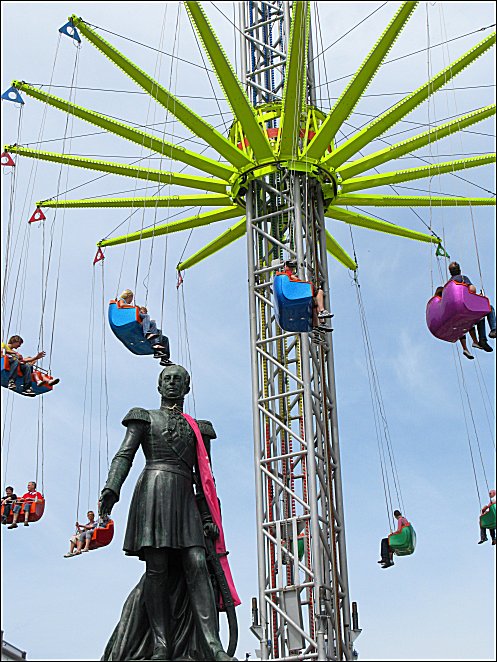
Dutch landscapes
Tilburg Kermis 2 – July 2009
Photos fdm magazine
fleursdumal.nl magazine
More in: Dutch Landscapes
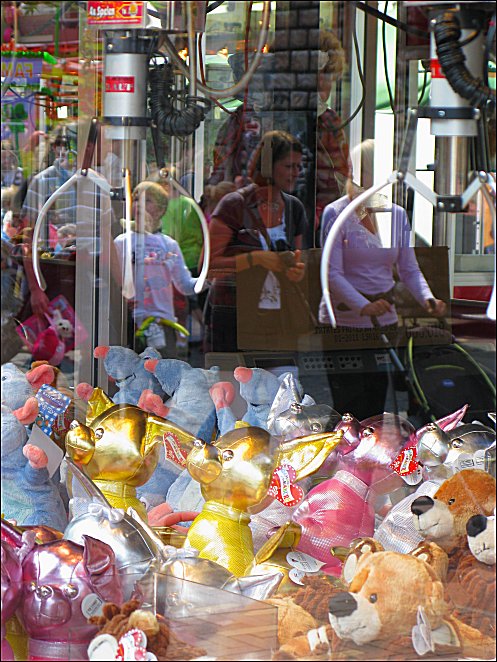
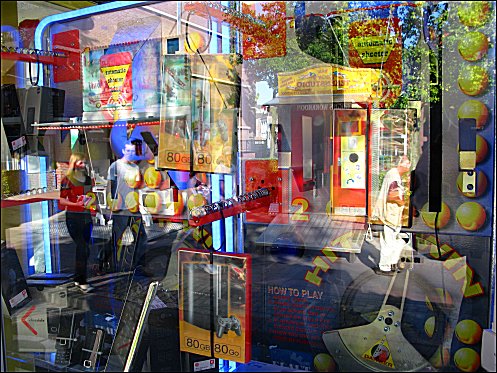
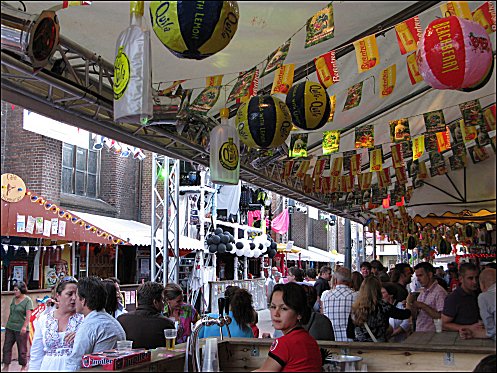




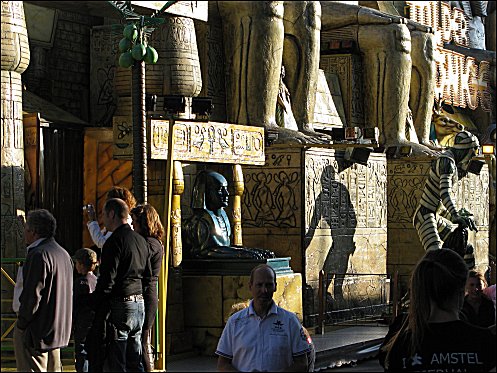

.jpg)
.jpg)
Dutch Landscapes
Tilburg Kermis – July 2009
Photos fdm
fleursdumal.nl magazine – magazine for art & literature
More in: Dutch Landscapes
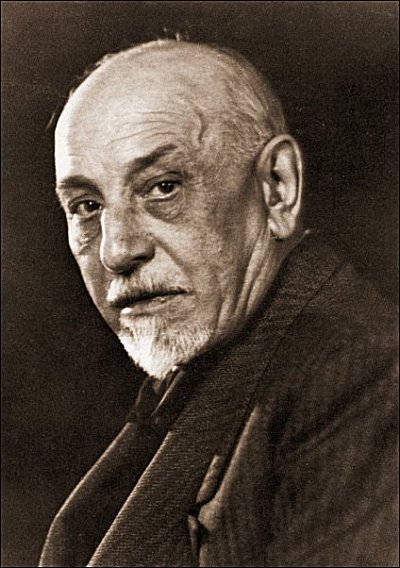
L u i g i P i r a n d e l l o
(1867-1936)
L’Occhio per la Morte
Sono stato a veder l’amico morto.
Sta benone. Men brutto (ah, brutto egli era
povero amico!): e quel pallor di cera
e la calma in cui sta da savio assorto,
gli dànno or l’aria mesta e tollerante,
che si sforzò d’avere in vita, e certo
non ebbe. Intanto, che peccato! aperto
gli è rimasto quell’occhio, che in costante
studio lo tenne: or possiam dirlo, credo:
l’occhio di vetro. Orrendo, nella faccia
spenta, quel guardo fiso, di minaccia…
Quell’occhio par che dica ora: – «Io ci vedo!»
kempis poetry magazine
More in: Archive O-P, Pirandello, Luigi
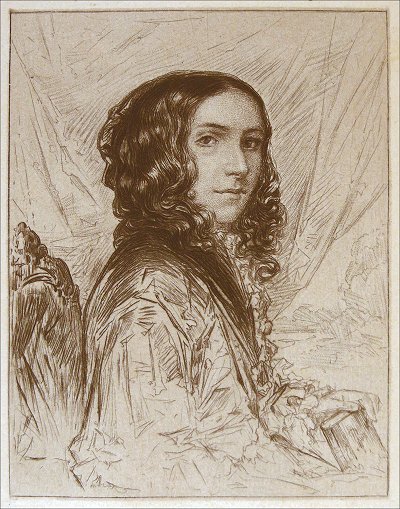
Elizabeth Barrett Browning
(1806-1861)
SONNETS FROM THE PORTUGUESE
I
I thought once how Theocritus had sung
Of the sweet years, the dear and wished-for years,
Who each one in a gracious hand appears
To bear a gift for mortals, old or young:
And, as I mused it in his antique tongue,
I saw, in gradual vision through my tears,
The sweet, sad years, the melancholy years,
Those of my own life, who by turns had flung
A shadow across me. Straightway I was ‘ware,
So weeping, how a mystic Shape did move
Behind me, and drew me backward by the hair;
And a voice said in mastery, while I strove,–
"Guess now who holds thee!"–"Death," I said, But, there,
The silver answer rang, "Not Death, but Love."
II
But only three in all God’s universe
Have heard this word thou hast said,–Himself, beside
Thee speaking, and me listening! and replied
One of us . . . that was God, . . . and laid the curse
So darkly on my eyelids, as to amerce
My sight from seeing thee,–that if I had died,
The death-weights, placed there, would have signified
Less absolute exclusion. "Nay" is worse
From God than from all others, O my friend!
Men could not part us with their worldly jars,
Nor the seas change us, nor the tempests bend;
Our hands would touch for all the mountain-bars:
And, heaven being rolled between us at the end,
We should but vow the faster for the stars.
III
Unlike are we, unlike, O princely Heart!
Unlike our uses and our destinies.
Our ministering two angels look surprise
On one another, as they strike athwart
Their wings in passing. Thou, bethink thee, art
A guest for queens to social pageantries,
With gages from a hundred brighter eyes
Than tears even can make mine, to play thy part
Of chief musician. What hast thou to do
With looking from the lattice-lights at me,
A poor, tired, wandering singer, singing through
The dark, and leaning up a cypress tree?
The chrism is on thine head,–on mine, the dew,–
And Death must dig the level where these agree.
IV
Thou hast thy calling to some palace-floor,
Most gracious singer of high poems! where
The dancers will break footing, from the care
Of watching up thy pregnant lips for more.
And dost thou lift this house’s latch too poor
For hand of thine? and canst thou think and bear
To let thy music drop here unaware
In folds of golden fulness at my door?
Look up and see the casement broken in,
The bats and owlets builders in the roof!
My cricket chirps against thy mandolin.
Hush, call no echo up in further proof
Of desolation! there’s a voice within
That weeps . . . as thou must sing . . . alone, aloof.
V
I lift my heavy heart up solemnly,
As once Electra her sepulchral urn,
And, looking in thine eyes, I over-turn
The ashes at thy feet. Behold and see
What a great heap of grief lay hid in me,
And how the red wild sparkles dimly burn
Through the ashen greyness. If thy foot in scorn
Could tread them out to darkness utterly,
It might be well perhaps. But if instead
Thou wait beside me for the wind to blow
The grey dust up, . . . those laurels on thine head,
O my Beloved, will not shield thee so,
That none of all the fires shall scorch and shred
The hair beneath. Stand further off then! go!
VI
Go from me. Yet I feel that I shall stand
Henceforward in thy shadow. Nevermore
Alone upon the threshold of my door
Of individual life, I shall command
The uses of my soul, nor lift my hand
Serenely in the sunshine as before,
Without the sense of that which I forbore–
Thy touch upon the palm. The widest land
Doom takes to part us, leaves thy heart in mine
With pulses that beat double. What I do
And what I dream include thee, as the wine
Must taste of its own grapes. And when I sue
God for myself, He hears that name of thine,
And sees within my eyes the tears of two.
VII
The face of all the world is changed, I think,
Since first I heard the footsteps of thy soul
Move still, oh, still, beside me, as they stole
Betwixt me and the dreadful outer brink
Of obvious death, where I, who thought to sink,
Was caught up into love, and taught the whole
Of life in a new rhythm. The cup of dole
God gave for baptism, I am fain to drink,
And praise its sweetness, Sweet, with thee anear.
The names of country, heaven, are changed away
For where thou art or shalt be, there or here;
And this . . . this lute and song . . . loved yesterday,
(The singing angels know) are only dear
Because thy name moves right in what they say.
VIII
What can I give thee back, O liberal
And princely giver, who hast brought the gold
And purple of thine heart, unstained, untold,
And laid them on the outside of the wall
For such as I to take or leave withal,
In unexpected largesse? am I cold,
Ungrateful, that for these most manifold
High gifts, I render nothing back at all?
Not so; not cold,–but very poor instead.
Ask God who knows. For frequent tears have run
The colours from my life, and left so dead
And pale a stuff, it were not fitly done
To give the same as pillow to thy head.
Go farther! let it serve to trample on.
IX
Can it be right to give what I can give?
To let thee sit beneath the fall of tears
As salt as mine, and hear the sighing years
Re-sighing on my lips renunciative
Through those infrequent smiles which fail to live
For all thy adjurations? O my fears,
That this can scarce be right! We are not peers
So to be lovers; and I own, and grieve,
That givers of such gifts as mine are, must
Be counted with the ungenerous. Out, alas!
I will not soil thy purple with my dust,
Nor breathe my poison on thy Venice-glass,
Nor give thee any love–which were unjust.
Beloved, I only love thee! let it pass.
X
Yet, love, mere love, is beautiful indeed
And worthy of acceptation. Fire is bright,
Let temple burn, or flax; an equal light
Leaps in the flame from cedar-plank or weed:
And love is fire. And when I say at need
I love thee . . . mark! . . . I love thee–in thy sight
I stand transfigured, glorified aright,
With conscience of the new rays that proceed
Out of my face toward thine. There’s nothing low
In love, when love the lowest: meanest creatures
Who love God, God accepts while loving so.
And what I feel, across the inferior features
Of what I am, doth flash itself, and show
How that great work of Love enhances Nature’s.

XI
And therefore if to love can be desert,
I am not all unworthy. Cheeks as pale
As these you see, and trembling knees that fail
To bear the burden of a heavy heart,–
This weary minstrel-life that once was girt
To climb Aornus, and can scarce avail
To pipe now ‘gainst the valley nightingale
A melancholy music,–why advert
To these things? O Beloved, it is plain
I am not of thy worth nor for thy place!
And yet, because I love thee, I obtain
From that same love this vindicating grace
To live on still in love, and yet in vain,–
To bless thee, yet renounce thee to thy face.
XII
Indeed this very love which is my boast,
And which, when rising up from breast to brow,
Doth crown me with a ruby large enow
To draw men’s eyes and prove the inner cost,–
This love even, all my worth, to the uttermost,
I should not love withal, unless that thou
Hadst set me an example, shown me how,
When first thine earnest eyes with mine were crossed,
And love called love. And thus, I cannot speak
Of love even, as a good thing of my own:
Thy soul hath snatched up mine all faint and weak,
And placed it by thee on a golden throne,–
And that I love (O soul, we must be meek!)
Is by thee only, whom I love alone.
XIII
And wilt thou have me fashion into speech
The love I bear thee, finding words enough,
And hold the torch out, while the winds are rough,
Between our faces, to cast light on each?–
I drop it at thy feet. I cannot teach
My hand to hold my spirits so far off
From myself–me–that I should bring thee proof
In words, of love hid in me out of reach.
Nay, let the silence of my womanhood
Commend my woman-love to thy belief,–
Seeing that I stand unwon, however wooed,
And rend the garment of my life, in brief,
By a most dauntless, voiceless fortitude,
Lest one touch of this heart convey its grief.
XIV
If thou must love me, let it be for nought
Except for love’s sake only. Do not say
"I love her for her smile–her look–her way
Of speaking gently,–for a trick of thought
That falls in well with mine, and certes brought
A sense of pleasant ease on such a day"–
For these things in themselves, Beloved, may
Be changed, or change for thee,–and love, so wrought,
May be unwrought so. Neither love me for
Thine own dear pity’s wiping my cheeks dry,–
A creature might forget to weep, who bore
Thy comfort long, and lose thy love thereby!
But love me for love’s sake, that evermore
Thou may’st love on, through love’s eternity.
XV
Accuse me not, beseech thee, that I wear
Too calm and sad a face in front of thine;
For we two look two ways, and cannot shine
With the same sunlight on our brow and hair.
On me thou lookest with no doubting care,
As on a bee shut in a crystalline;
Since sorrow hath shut me safe in love’s divine,
And to spread wing and fly in the outer air
Were most impossible failure, if I strove
To fail so. But I look on thee–on thee–
Beholding, besides love, the end of love,
Hearing oblivion beyond memory;
As one who sits and gazes from above,
Over the rivers to the bitter sea.
XVI
And yet, because thou overcomest so,
Because thou art more noble and like a king,
Thou canst prevail against my fears and fling
Thy purple round me, till my heart shall grow
Too close against thine heart henceforth to know
How it shook when alone. Why, conquering
May prove as lordly and complete a thing
In lifting upward, as in crushing low!
And as a vanquished soldier yields his sword
To one who lifts him from the bloody earth,
Even so, Beloved, I at last record,
Here ends my strife. If thou invite me forth,
I rise above abasement at the word.
Make thy love larger to enlarge my worth!
XVII
My poet, thou canst touch on all the notes
God set between His After and Before,
And strike up and strike off the general roar
Of the rushing worlds a melody that floats
In a serene air purely. Antidotes
Of medicated music, answering for
Mankind’s forlornest uses, thou canst pour
From thence into their ears. God’s will devotes
Thine to such ends, and mine to wait on thine.
How, Dearest, wilt thou have me for most use?
A hope, to sing by gladly? or a fine
Sad memory, with thy songs to interfuse?
A shade, in which to sing–of palm or pine?
A grave, on which to rest from singing? Choose.
XVIII
I never gave a lock of hair away
To a man, Dearest, except this to thee,
Which now upon my fingers thoughtfully
I ring out to the full brown length and say
"Take it." My day of youth went yesterday;
My hair no longer bounds to my foot’s glee,
Nor plant I it from rose- or myrtle-tree,
As girls do, any more: it only may
Now shade on two pale cheeks the mark of tears,
Taught drooping from the head that hangs aside
Through sorrow’s trick. I thought the funeral-shears
Would take this first, but Love is justified,–
Take it thou,–finding pure, from all those years,
The kiss my mother left here when she died.
XIX
The soul’s Rialto hath its merchandize;
I barter curl for curl upon that mart,
And from my poet’s forehead to my heart
Receive this lock which outweighs argosies,–
As purply black, as erst to Pindar’s eyes
The dim purpureal tresses gloomed athwart
The nine white Muse-brows. For this counterpart, . . .
The bay crown’s shade, Beloved, I surmise,
Still lingers on thy curl, it is so black!
Thus, with a fillet of smooth-kissing breath,
I tie the shadows safe from gliding back,
And lay the gift where nothing hindereth;
Here on my heart, as on thy brow, to lack
No natural heat till mine grows cold in death.
XX
Beloved, my Beloved, when I think
That thou wast in the world a year ago,
What time I sat alone here in the snow
And saw no footprint, heard the silence sink
No moment at thy voice, but, link by link,
Went counting all my chains as if that so
They never could fall off at any blow
Struck by thy possible hand,–why, thus I drink
Of life’s great cup of wonder! Wonderful,
Never to feel thee thrill the day or night
With personal act or speech,–nor ever cull
Some prescience of thee with the blossoms white
Thou sawest growing! Atheists are as dull,
Who cannot guess God’s presence out of sight.

XXI
Say over again, and yet once over again,
That thou dost love me. Though the word repeated
Should seem a "cuckoo-song," as thou dost treat it,
Remember, never to the hill or plain,
Valley and wood, without her cuckoo-strain
Comes the fresh Spring in all her green completed.
Beloved, I, amid the darkness greeted
By a doubtful spirit-voice, in that doubt’s pain
Cry, "Speak once more–thou lovest!" Who can fear
Too many stars, though each in heaven shall roll,
Too many flowers, though each shall crown the year?
Say thou dost love me, love me, love me–toll
The silver iterance!–only minding, Dear,
To love me also in silence with thy soul.
XXII
When our two souls stand up erect and strong,
Face to face, silent, drawing nigh and nigher,
Until the lengthening wings break into fire
At either curved point,–what bitter wrong
Can the earth do to us, that we should not long
Be here contented? Think! In mounting higher,
The angels would press on us and aspire
To drop some golden orb of perfect song
Into our deep, dear silence. Let us stay
Rather on earth, Beloved,–where the unfit
Contrarious moods of men recoil away
And isolate pure spirits, and permit
A place to stand and love in for a day,
With darkness and the death-hour rounding it.
XXIII
Is it indeed so? If I lay here dead,
Wouldst thou miss any life in losing mine?
And would the sun for thee more coldly shine
Because of grave-damps falling round my head?
I marvelled, my Beloved, when I read
Thy thought so in the letter. I am thine–
But . . . so much to thee? Can I pour thy wine
While my hands tremble? Then my soul, instead
Of dreams of death, resumes life’s lower range.
Then, love me, Love! look on me–breathe on me!
As brighter ladies do not count it strange,
For love, to give up acres and degree,
I yield the grave for thy sake, and exchange
My near sweet view of heaven, for earth with thee!
XXIV
Let the world’s sharpness like a clasping knife
Shut in upon itself and do no harm
In this close hand of Love, now soft and warm,
And let us hear no sound of human strife
After the click of the shutting. Life to life–
I lean upon thee, Dear, without alarm,
And feel as safe as guarded by a charm
Against the stab of worldlings, who if rife
Are weak to injure. Very whitely still
The lilies of our lives may reassure
Their blossoms from their roots, accessible
Alone to heavenly dews that drop not fewer;
Growing straight, out of man’s reach, on the hill.
God only, who made us rich, can make us poor.
XXV
A heavy heart, Beloved, have I borne
From year to year until I saw thy face,
And sorrow after sorrow took the place
Of all those natural joys as lightly worn
As the stringed pearls, each lifted in its turn
By a beating heart at dance-time. Hopes apace
Were changed to long despairs, till God’s own grace
Could scarcely lift above the world forlorn
My heavy heart. Then thou didst bid me bring
And let it drop adown thy calmly great
Deep being! Fast it sinketh, as a thing
Which its own nature does precipitate,
While thine doth close above it, mediating
Betwixt the stars and the unaccomplished fate.
XXVI
I lived with visions for my company
Instead of men and women, years ago,
And found them gentle mates, nor thought to know
A sweeter music than they played to me.
But soon their trailing purple was not free
Of this world’s dust, their lutes did silent grow,
And I myself grew faint and blind below
Their vanishing eyes. Then thou didst come–to be,
Beloved, what they seemed. Their shining fronts,
Their songs, their splendours, (better, yet the same,
As river-water hallowed into fonts)
Met in thee, and from out thee overcame
My soul with satisfaction of all wants:
Because God’s gifts put man’s best dreams to shame.
XXVII
My own Beloved, who hast lifted me
From this drear flat of earth where I was thrown,
And, in betwixt the languid ringlets, blown
A life-breath, till the forehead hopefully
Shines out again, as all the angels see,
Before thy saving kiss! My own, my own,
Who camest to me when the world was gone,
And I who looked for only God, found thee!
I find thee; I am safe, and strong, and glad.
As one who stands in dewless asphodel,
Looks backward on the tedious time he had
In the upper life,–so I, with bosom-swell,
Make witness, here, between the good and bad,
That Love, as strong as Death, retrieves as well.
XXVIII
My letters! all dead paper, mute and white!
And yet they seem alive and quivering
Against my tremulous hands which loose the string
And let them drop down on my knee to-night.
This said,–he wished to have me in his sight
Once, as a friend: this fixed a day in spring
To come and touch my hand . . . a simple thing,
Yet I wept for it!–this, . . . the paper’s light . . .
Said, Dear I love thee; and I sank and quailed
As if God’s future thundered on my past.
This said, I am thine–and so its ink has paled
With lying at my heart that beat too fast.
And this . . . O Love, thy words have ill availed
If, what this said, I dared repeat at last!
XXIX
I think of thee!–my thoughts do twine and bud
About thee, as wild vines, about a tree,
Put out broad leaves, and soon there’s nought to see
Except the straggling green which hides the wood.
Yet, O my palm-tree, be it understood
I will not have my thoughts instead of thee
Who art dearer, better! Rather, instantly
Renew thy presence; as a strong tree should,
Rustle thy boughs and set thy trunk all bare,
And let these bands of greenery which insphere thee,
Drop heavily down,–burst, shattered everywhere!
Because, in this deep joy to see and hear thee
And breathe within thy shadow a new air,
I do not think of thee–I am too near thee.
XXX
I see thine image through my tears to-night,
And yet to-day I saw thee smiling. How
Refer the cause?–Beloved, is it thou
Or I, who makes me sad? The acolyte
Amid the chanted joy and thankful rite
May so fall flat, with pale insensate brow,
On the altar-stair. I hear thy voice and vow,
Perplexed, uncertain, since thou art out of sight,
As he, in his swooning ears, the choir’s amen.
Beloved, dost thou love? or did I see all
The glory as I dreamed, and fainted when
Too vehement light dilated my ideal,
For my soul’s eyes? Will that light come again,
As now these tears come–falling hot and real?
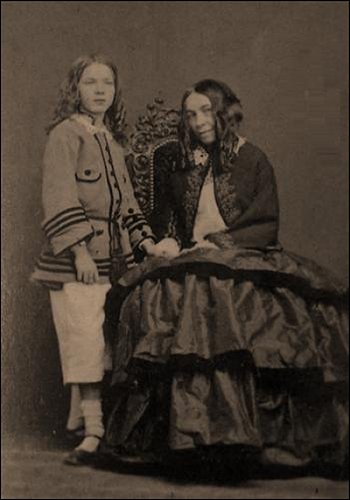
XXXI
Thou comest! all is said without a word.
I sit beneath thy looks, as children do
In the noon-sun, with souls that tremble through
Their happy eyelids from an unaverred
Yet prodigal inward joy. Behold, I erred
In that last doubt! and yet I cannot rue
The sin most, but the occasion–that we two
Should for a moment stand unministered
By a mutual presence. Ah, keep near and close,
Thou dove-like help! and when my fears would rise,
With thy broad heart serenely interpose:
Brood down with thy divine sufficiencies
These thoughts which tremble when bereft of those,
Like callow birds left desert to the skies.
XXXII
The first time that the sun rose on thine oath
To love me, I looked forward to the moon
To slacken all those bonds which seemed too soon
And quickly tied to make a lasting troth.
Quick-loving hearts, I thought, may quickly loathe;
And, looking on myself, I seemed not one
For such man’s love!–more like an out-of-tune
Worn viol, a good singer would be wroth
To spoil his song with, and which, snatched in haste,
Is laid down at the first ill-sounding note.
I did not wrong myself so, but I placed
A wrong on thee. For perfect strains may float
‘Neath master-hands, from instruments defaced,–
And great souls, at one stroke, may do and doat.
XXXIII
Yes, call me by my pet-name! let me hear
The name I used to run at, when a child,
From innocent play, and leave the cowslips plied,
To glance up in some face that proved me dear
With the look of its eyes. I miss the clear
Fond voices which, being drawn and reconciled
Into the music of Heaven’s undefiled,
Call me no longer. Silence on the bier,
While I call God–call God!–so let thy mouth
Be heir to those who are now exanimate.
Gather the north flowers to complete the south,
And catch the early love up in the late.
Yes, call me by that name,–and I, in truth,
With the same heart, will answer and not wait.
XXXIV
With the same heart, I said, I’ll answer thee
As those, when thou shalt call me by my name–
Lo, the vain promise! is the same, the same,
Perplexed and ruffled by life’s strategy?
When called before, I told how hastily
I dropped my flowers or brake off from a game.
To run and answer with the smile that came
At play last moment, and went on with me
Through my obedience. When I answer now,
I drop a grave thought, break from solitude;
Yet still my heart goes to thee–ponder how–
Not as to a single good, but all my good!
Lay thy hand on it, best one, and allow
That no child’s foot could run fast as this blood.
XXXV
If I leave all for thee, wilt thou exchange
And be all to me? Shall I never miss
Home-talk and blessing and the common kiss
That comes to each in turn, nor count it strange,
When I look up, to drop on a new range
Of walls and floors, another home than this?
Nay, wilt thou fill that place by me which is
Filled by dead eyes too tender to know change
That’s hardest. If to conquer love, has tried,
To conquer grief, tries more, as all things prove,
For grief indeed is love and grief beside.
Alas, I have grieved so I am hard to love.
Yet love me–wilt thou? Open thy heart wide,
And fold within, the wet wings of thy dove.
XXXVI
When we met first and loved, I did not build
Upon the event with marble. Could it mean
To last, a love set pendulous between
Sorrow and sorrow? Nay, I rather thrilled,
Distrusting every light that seemed to gild
The onward path, and feared to overlean
A finger even. And, though I have grown serene
And strong since then, I think that God has willed
A still renewable fear . . . O love, O troth . . .
Lest these enclasped hands should never hold,
This mutual kiss drop down between us both
As an unowned thing, once the lips being cold.
And Love, be false! if he, to keep one oath,
Must lose one joy, by his life’s star foretold.
XXXVII
Pardon, oh, pardon, that my soul should make
Of all that strong divineness which I know
For thine and thee, an image only so
Formed of the sand, and fit to shift and break.
It is that distant years which did not take
Thy sovranty, recoiling with a blow,
Have forced my swimming brain to undergo
Their doubt and dread, and blindly to forsake
Thy purity of likeness and distort
Thy worthiest love to a worthless counterfeit.
As if a shipwrecked Pagan, safe in port,
His guardian sea-god to commemorate,
Should set a sculptured porpoise, gills a-snort
And vibrant tail, within the temple-gate.
XXXVIII
First time he kissed me, he but only kissed
The fingers of this hand wherewith I write;
And ever since, it grew more clean and white.
Slow to world-greetings, quick with its "O, list,"
When the angels speak. A ring of amethyst
I could not wear here, plainer to my sight,
Than that first kiss. The second passed in height
The first, and sought the forehead, and half missed,
Half falling on the hair. O beyond meed!
That was the chrism of love, which love’s own crown,
With sanctifying sweetness, did precede
The third upon my lips was folded down
In perfect, purple state; since when, indeed,
I have been proud and said, "My love, my own."
XXXIX
Because thou hast the power and own’st the grace
To look through and behind this mask of me,
(Against which, years have beat thus blanchingly,
With their rains,) and behold my soul’s true face,
The dim and weary witness of life’s race,–
Because thou hast the faith and love to see,
Through that same soul’s distracting lethargy,
The patient angel waiting for a place
In the new Heavens,–because nor sin nor woe,
Nor God’s infliction, nor death’s neighbourhood,
Nor all which others viewing, turn to go,
Nor all which makes me tired of all, self-viewed,–
Nothing repels thee, . . . Dearest, teach me so
To pour out gratitude, as thou dost, good!
XL
Oh, yes! they love through all this world of ours!
I will not gainsay love, called love forsooth:
I have heard love talked in my early youth,
And since, not so long back but that the flowers
Then gathered, smell still. Mussulmans and Giaours
Throw kerchiefs at a smile, and have no ruth
For any weeping. Polypheme’s white tooth
Slips on the nut if, after frequent showers,
The shell is over-smooth,–and not so much
Will turn the thing called love, aside to hate
Or else to oblivion. But thou art not such
A lover, my Beloved! thou canst wait
Through sorrow and sickness, to bring souls to touch,
And think it soon when others cry "Too late."
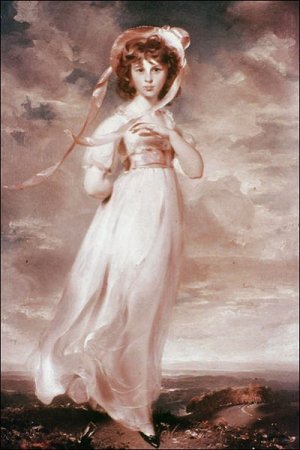
XLI
I thank all who have loved me in their hearts,
With thanks and love from mine. Deep thanks to all
Who paused a little near the prison-wall
To hear my music in its louder parts
Ere they went onward, each one to the mart’s
Or temple’s occupation, beyond call.
But thou, who, in my voice’s sink and fall
When the sob took it, thy divinest Art’s
Own instrument didst drop down at thy foot
To harken what I said between my tears, . . .
Instruct me how to thank thee! Oh, to shoot
My soul’s full meaning into future years,
That they should lend it utterance, and salute
Love that endures, from life that disappears!
XLII
My future will not copy fair my past–
I wrote that once; and thinking at my side
My ministering life-angel justified
The word by his appealing look upcast
To the white throne of God, I turned at last,
And there, instead, saw thee, not unallied
To angels in thy soul! Then I, long tried
By natural ills, received the comfort fast,
While budding, at thy sight, my pilgrim’s staff
Gave out green leaves with morning dews impearled.
I seek no copy now of life’s first half:
Leave here the pages with long musing curled,
And write me new my future’s epigraph,
New angel mine, unhoped for in the world!
XLIII
How do I love thee? Let me count the ways.
I love thee to the depth and breadth and height
My soul can reach, when feeling out of sight
For the ends of Being and ideal Grace.
I love thee to the level of everyday’s
Most quiet need, by sun and candlelight.
I love thee freely, as men strive for Right;
I love thee purely, as they turn from Praise.
I love thee with the passion put to use
In my old griefs, and with my childhood’s faith.
I love thee with a love I seemed to lose
With my lost saints,–I love thee with the breath,
Smiles, tears, of all my life!–and, if God choose,
I shall but love thee better after death.
XLIV
Beloved, thou hast brought me many flowers
Plucked in the garden, all the summer through,
And winter, and it seemed as if they grew
In this close room, nor missed the sun and showers.
So, in the like name of that love of ours,
Take back these thoughts which here unfolded too,
And which on warm and cold days I withdrew
From my heart’s ground. Indeed, those beds and bowers
Be overgrown with bitter weeds and rue,
And wait thy weeding; yet here’s eglantine,
Here’s ivy!–take them, as I used to do
Thy flowers, and keep them where they shall not pine.
Instruct thine eyes to keep their colours true,
And tell thy soul, their roots are left in mine.
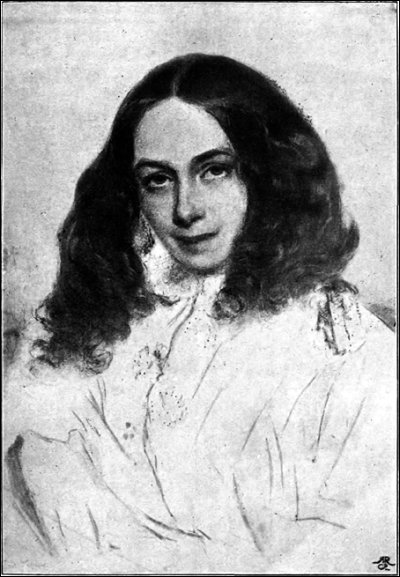
Elizabeth Barrett Browning: Sonnets from the Portuguese
KEMP=MAG – kempis poetry magazine
More in: Barrett Browning, Elizabeth
.jpg)
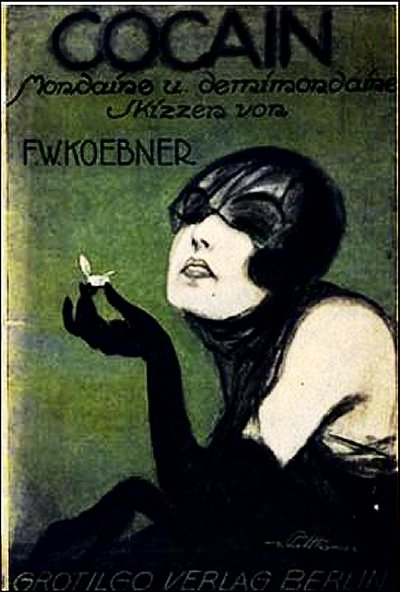
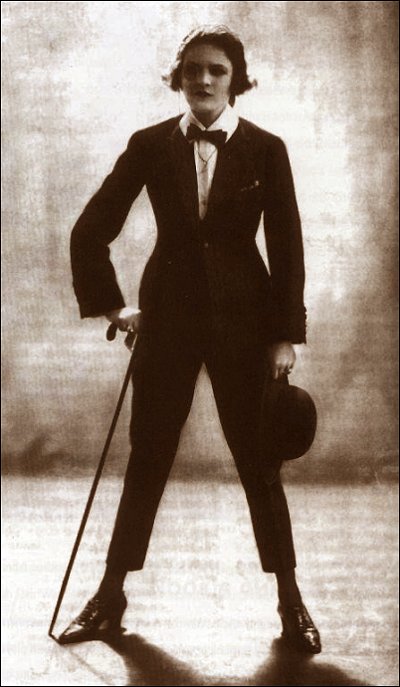
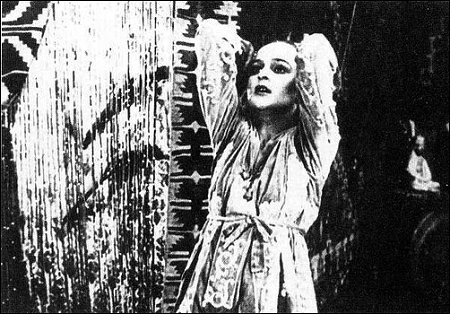
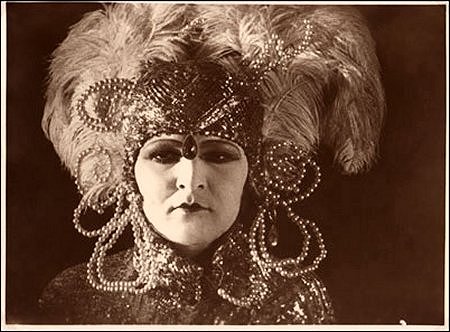
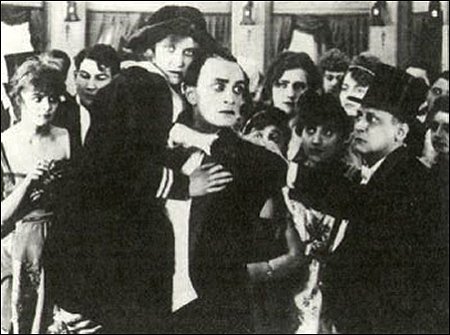

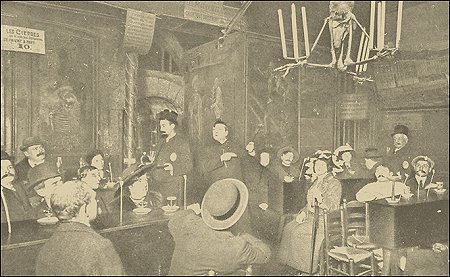
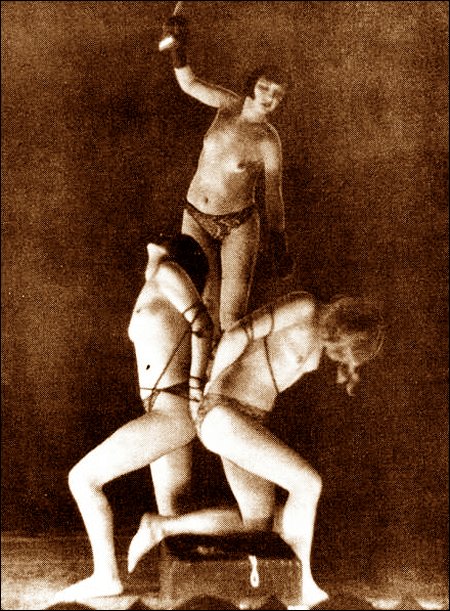

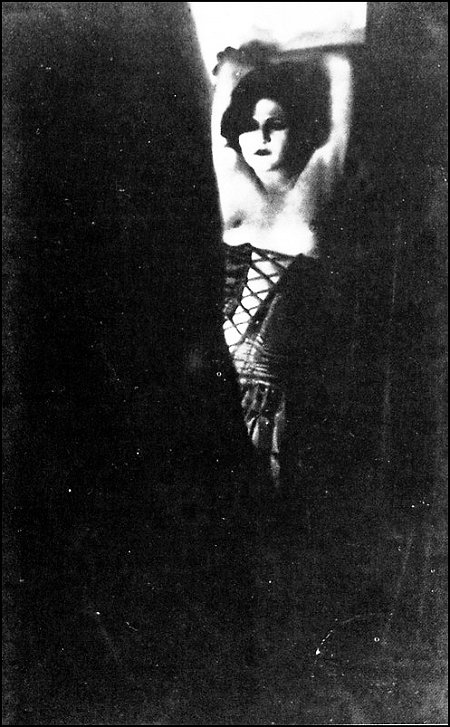
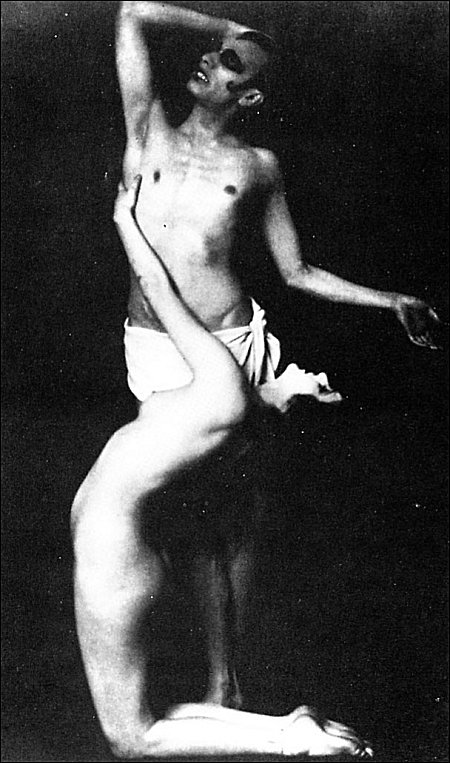
Galerie Anita Berber – 2
Anita Berber (1899-1928)
fleursdumal.nl magazine – magazine for art & literature
More in: Anita Berber, Anita Berber, Berber, Berber, Anita, DANCE & PERFORMANCE
Thank you for reading Fleurs du Mal - magazine for art & literature